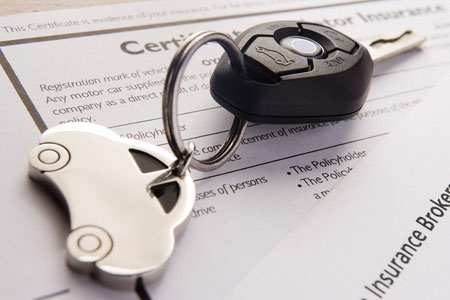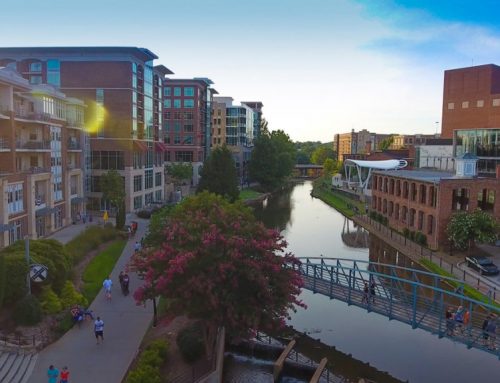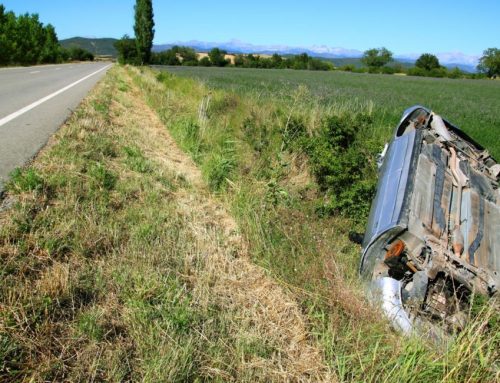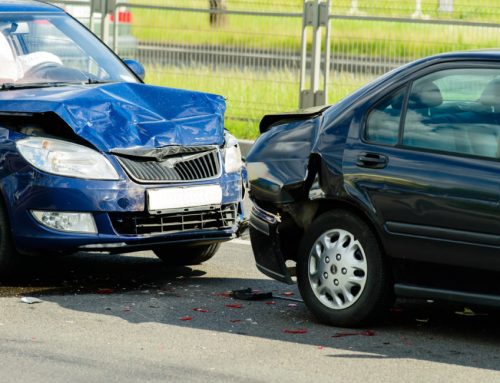John Maher: Hi, I’m John Maher. Today, I’m speaking with Russell Guest and Richard Allen of Guest & Brady in Greenville, South Carolina. Guest & Brady is a personal injury law firm. Today, we’re going to be talking about car accident insurance, underinsurance and uninsured drivers.
Russell and Richard, welcome.
Russell Guest: Thanks, John. This is Russell. It’s good to be here.
Richard Allen: Good morning, John. This is Richard. Thanks for having us.
The Difference Between Uninsured and Underinsured Motorists
John: Sure. Gentlemen, what is the difference between uninsured and underinsured when it comes to a car accident insurance?
Russell: I’ll start on this. There is certainly automobile insurance that’s required in all 50 states.
There are some limits, and they’re different for each state. In South Carolina, the limits that are required are $25,000 and $50,000 in coverage. Sometimes, people get that confused, I’ll just explain that for a moment.
It says, $25,000, meaning that that’s the most a single person could get out of that particular accident, or up to that amount. And $50,000 is the total that’s available for that particular accident or occurrence.
If there were multiple people involved in that accident, including all the people injured in the various vehicles that might be involved, the most that the insurance company would have to pay is the amount for which it was contracted. If it’s for minimum limits in South Carolina, it would be $50,000, regardless of the number of injuries or the total dollar amount.
The insurance is there simply to allow you to drive legal and to protect you on the roadway should you be the person that is at fault in the accident in terms of liability and coverage.
It’s an automatic coverage that comes in South Carolina. It’s uninsured coverage whenever you purchase liability coverage. When you purchase that, it will allow you to be legal on the roadway in South Carolina.
Now, the problem is that often people are just trying to get the least amount of premium that they can get in order to drive legal. That’s a mistake. It is not considerably more expensive. It’s a lot less expensive to purchase coverage called “underinsurance coverage.”
If we think in terms of what the cost of the liability coverage is compared to the underinsurance coverage, the underinsurance coverage is just a fraction of an additional cost. It’s well worth it.
The reason that it’s well worth it is that I have been doing injury work for many years, and have seen lots of different people in lots of different circumstances. Some [with] severe injuries. In South Carolina, it is absolutely true that the person who caused the injury is responsible for all the legal damages that are incurred.
Let’s say that I’m injured and somebody caused the injury to me. I experienced $500,000 in medical, which is not difficult to happen. Or even $100,000 in medical. I have a simple surgery to my knee or to my shoulder, and all of a sudden my damages are certainly $100,000, easily.
If the “at fault” driver has only had $25,000 in coverage, and they were legal, then the insurance company might be willing to pay that $25,000 to me, but you can see the difference. If I have $100,000 in medical and they’ve only got $25,000, then we’re out $75,000.
Yes, they have the legal obligation to pay the difference, but typically, most people do not have the ability financially to cover the difference. You can go and get a judgment against that person for the difference, and maybe even more because of the pain and suffering that they’ve cost, but I will at that point only have a piece of paper for which I have a judgment against that person.
Then, I cannot in any way garnish their wages. I cannot [in] any way force them to pay that bill to me, unless by chance they come into some money. They win the lottery or they have a big inheritance, which is certainly unlikely as you can imagine.
The best way to protect yourself from these circumstances and devastating financial loss including the disability that you might have experienced is to purchase additional insurance. That is through underinsurance.
We’ve had the experience of seeing grown men sitting across the table crying, because they did not choose to purchase the underinsurance coverage. And yet, they were convinced that the other person had the responsibility to actually pay for it. It is absolutely true, but they don’t have the means to pay for it.
Richard: Right. Now, they’re in this deficit.
John: It’s important for a person to purchase underinsurance on their coverage so that in the case where they are in an accident and somebody else is at fault, but doesn’t have enough insurance to cover your expenses, your medical expenses or whatever it is, that underinsurance can help to make up the difference.
Then, how is that exactly different than uninsured coverage?
What Happens When the “At Fault” Driver is Completely Uninsured
Richard: The uninsured coverage is when the “at fault” driver doesn’t have insurance on their vehicle. That could be for different reasons.
Either they chose not to purchase a premium, or they’ve had a lapse in their payment of their car accident insurance premiums by mistake. They just were not aware or they were certain that they did, but they didn’t, and so it was just a simple mistake that they made.
The insurance company is standing to their position that the premium wasn’t paid, [so] there is no coverage on the vehicle. Then, it comes back to you and your particular coverage. On your policy, there would be an uninsured coverage that you could make a claim against.
Russell: Underinsured is when that earlier example that I gave where the other person simply didn’t have enough insurance to cover the total amount of the damages that the injured person may have experienced.
John: Right.
Russell: After the liability coverage for the “at fault” driver has paid, now, you’ve gone under the underinsured coverage on your own vehicle.
John: Right. Both of these are coverage that you should get on your own insurance in the event that you’re in an accident and there’s either no insurance or not enough insurance with the other person that you were in the accident with.
Richard: That’s right.
Russell: This happens. It’s fairly common that people are uninsured. I know in South Carolina that there have been studies done. The last one I saw said there were 11% of the drivers on the roadway [who] were driving uninsured.
Why Insurance Coverage Matters When You’ve Been Injured
John: You’ve gone into obviously some important reasons why insurance is important. What are some of the reasons why insurance coverage matters if you’ve been injured in a car accident?
I think we often think of insurance as just covering the damage to my car so that I can get a new car or I can get repairs done to my car. But if you’ve really been injured in a car accident, why is it that insurance coverage matters?
Richard: John, this is Richard. It’s important because, as Russell touched on, I think we all know that [there are] exorbitant costs that go along with getting medical treatment when you are injured in a car accident. But it’s not just the treatment you are facing as far as damages go, because oftentimes, we see clients with many other types of damages.
For instance, depending on the severity of the injuries, they could be faced with permanent injuries that require ongoing future care. That is a compensable element of damages that you could very likely incur if you’re in a car accident.
We often see clients who are out of work, not only temporarily, but if they do suffer an injury that might put them out of work, then, they’re also faced with the inability to earn income.
It’s not just the property damage to your vehicle. It’s not just the medical bills that you’re faced with initially. You can very well have these future components that stay with you indefinitely.
Again, we just cannot stress the importance of purchasing the underinsurance coverage. Not only on a single vehicle or a single person. If you’re talking about a family, with multiple cars in a household, it’s good to have underinsurance coverage on each vehicle and to make sure that each resident family member or relative has also got that coverage, because it allows you to stack the individual coverages in that instance.
That might be, as far as the stacking issue, fodder for another blog or podcast.
Russell: Sure.
John: Russell, you talked a little bit about underinsurance and uninsurance, what recourse does someone who’s injured in a car accident have if the other driver is truly uninsured? They just don’t have any insurance. How does that affect the recourse in terms of getting compensation for the accident that you had and your injuries?
Russell: You are limited to the coverage then that would be on your own policy. If you made the decision to choose limited coverage of 25/50, then, you would be limited to the coverage from your own policy of $25,000 as a maximum.
You might try to sue the uninsured person, but oftentimes, the reason the person is driving uninsured is because they simply are not the quality person that’s going to be out there able to pay any kind of judgment. You would be tilting at windmills at that point.
[With] the uninsured coverage, you can run into the situation where the person is truly uninsured, because they left the scene of the accident and they’re not known, they’re a John Doe driver at that point.
This is a situation where you have to identify the actual vehicle [and] that there was a vehicle present. Oftentimes, by a third party witness who writes an affidavit to actually claim the uninsured coverage on your own vehicle, because your own insurance might say, “I’m sorry. Even if that car was there, because you don’t have a witness, we’re going to deny your coverage.”
You have no coverage even from your own policy, which is a terrible situation to find yourself in. Make sure that you identify any and all witnesses whenever you’re at a scene of an accident, especially, if the car that ran you off the roadway or you collided with left the scene of the accident.
In an uninsured claim, you can run into a situation where now you don’t have coverage. Maybe for the same reason that you failed to make a premium that you thought you made. Now, your own insurance company is standing by the position that they’re simply not going to accept a claim on your own policy, because you just weren’t covered at that time.
Now, this is where you can still make some arguments. The insurance company has to make the offer to you for the uninsured and the underinsurance coverage in a particular manner. We as attorneys can help you to make sure that they covered all the legal procedures that they should have made in order to make that offer to you.
If they did not make all the proper procedures for the offer to you, then we can force them to reform their policy to include the coverage that you did not have. Now, you have availability of insurance coverage to help you with all of the damages, like Richard was talking about.
This is another reason to actually make sure that you consult with an attorney whenever you’re involved in an automobile accident.
Richard: I’d just like to add one thing to that, just Russell’s advice, just because insurance coverage can be a highly complex area of the law. You want to make sure that you are able to identify all the various coverages that might be available.
We’ve seen clients that have come in and have tried to handle a claim on their own. They were able to, I guess, make their way through dealing with the other driver’s liability carrier, but it turns out they didn’t understand how the underinsurance coverages worked. They did not make a timely claim, because there is a statute of limitations in South Carolina. You have to be aware of that. It’s critically important.
Russell: Also, there’s ways to settle a claim. You got to settle a claim in a particular method in order to make the underinsurance coverage available to you. The attorneys understand how to make that happen.
John: Right. There’s just a lot of nuances to the law and to working with insurance companies and making those claims. It sounds like it’s an important thing to make sure that you do consult with an attorney in a case like that, and really get some good advice.
Russell: Yes. That’s true. Our consultation would be free, there’s no reason not to come and spend time with us.
We’re going to spend an hour or so or more, depending upon what’s necessary to make sure that we thoroughly discuss your case with you and reviewed your case with you to see how we might be able to help you to resolve the issues of your claim.
John: Great. That’s excellent information. Russell Guest and Richard Allen, thanks again for speaking with me today.
Russell: Thanks, John.
Richard: Thank you.
John: For more information about Guest & Brady, visit their website at guestbrady.com or call 800‑903‑8101 or 864‑233‑7200.






